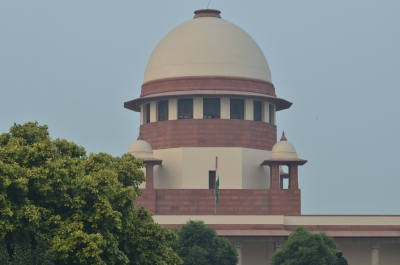Vax policy: Centre says no to judicial interference; SC rebuts
By IANS | Published: June 2, 2021 09:39 PM2021-06-02T21:39:03+5:302021-06-02T21:50:08+5:30
New Delhi, June 2 The Supreme Court on Wednesday hit back at the Centre's "do not interfere in ...

Vax policy: Centre says no to judicial interference; SC rebuts
New Delhi, June 2 The Supreme Court on Wednesday hit back at the Centre's "do not interfere in vaccine policy decision" stand, saying that it has the power for judicial review.
The top court closely scrutinised the Centre's 'Liberalised Vaccination Policy', and cited gaps besides passing a slew of directions, asking the government to file an affidavit, and address the issues and questions raised by the top court.
A bench comprising Justices D.Y. Chandrachud, L. Nageswara Rao and S. Ravindra Bhat said the court cannot remain a silent spectator when constitutional rights of the citizens are infringed by executive policies, and insisted that it has the power of judicial review.
"This court would, under the auspices of an open court judicial process, conduct deliberations with the executive where justifications for existing policies would be elicited and evaluated to assess whether they survive constitutional scrutiny," the bench noted.
The bench stressed that the courts have often reiterated the expertise of the executive in managing a public health crisis, and have also warned against arbitrary and irrational policies being excused in the garb of the "wide latitude" to battle a pandemic.
The top court cited five issues in the Centre's vaccine policy: Vaccine procurement and distribution among different categories of population, effects of vaccination by private hospitals, basis and impact of differential pricing, vaccine logistics and digital divide.
The top court passed a slew of directions under these core areas of the vaccine policy.
Under the Liberalised Vaccination Policy covering persons in the age group of 18-44 years, the total vaccines produced will be divided in a ratio of 50:25:25 between the Centre, state/UT governments and private hospitals.
The top court directed the Centre to place on record a roadmap of projected availability of vaccines till December 31, 2021 and sought clarification on the preparedness with respect to specific needs of children in the event of a third wave of the pandemic.
The bench noted that the state/UT governments are diverting the vaccines (procured by them at a higher price than the Central government) for the persons in the age group of 18-44 years to vaccinate persons above 45 years of age, due to a shortage of vaccines being supplied by the Centre.
The top court queried, "The Central government will factor this quantity and price differential into their subsequent allocation and disbursal of vaccines to states/UTs for the persons above 45 years of age."
Questioning the monitoring of disbursal of vaccines through private hospitals, the bench noted: "Private hospitals are not equally spread out across a state/UT and are often limited to bigger cities with large populations. As such, a larger quantity will be available in such cities, as opposed to the rural areas."
The bench asked the Centre whether it has conducted a "means-test" of the demography of a state/UT to assert that 50 per cent of the population in the 18-44 age group would be able to afford the vaccine.
If not, what is the rationale of private hospitals being provided an equal quota for procurement as the state/UT governments, it asked.
On the aspect of differential pricing, the court reiterated that the Centre should consider utilising its position as the monopolistic buyer in the market and pass down the benefit to all the persons.
The top court sought clarification on the justification for intervening in pre-fixing procurement prices and quantities for sates/UTs and private hospitals, but not imposing statutory price ceilings, and whether ICMR/BBIL formally invited contracts for voluntary licensing and if so, whether they have they received viable offers.
On the aspect of logistics, the court sought clarification on the manner in which the states/UTs are managing the logistical burden for vaccinating persons aged between 18 and 44 years, along with persons aged over 45 years.
The top court also flagged the digital divide afflicting the access to the CoWIN portal, stating that it could have serious implications on right to equality and right to health.
The order was passed by the top court in the suo motu case initiated by it to deal with issues relating to Covid-19 management in the country. It sought response from the Centre and the states within two weeks.
Disclaimer: This post has been auto-published from an agency feed without any modifications to the text and has not been reviewed by an editor
Open in app